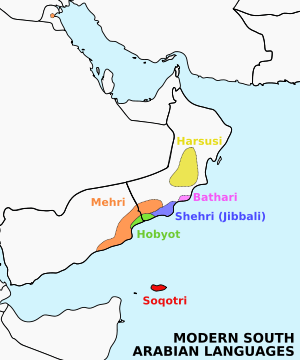Soqotri language
| Soqotri | |
|---|---|
| Pronunciation | [skˤʌtˤri][1] |
| Native to | Yemen |
| Region | Socotra |
| Ethnicity | Mehri |
Native speakers | (71,000 cited 1990)[2] |
| Language codes | |
| ISO 639-3 |
sqt |
| Glottolog |
soqo1240[3] |
 | |
Soqotri, or Socotri (autonym: méthel d-saqátri; Arabic: اللغة السقطرية) is a Semitic language spoken by the native Socotri population of Mehri people in the island of Socotra, and the Abd al Kuri and Samhah islands of the Socotra archipelago off the southern coast of the Republic of Yemen. It is one of the Modern South Arabian languages.
Soqotri speakers live on their islands, but rarely on the Yemeni mainland. The language was, through its history, isolated from the Arabian mainland. Arabic is also spoken in a dialectal form on Socotra.[4]
Phonetics
The isolation of the island of Socotra has led to the Soqotri language independently developing certain phonetic characteristics absent in even the closely related languages of the mainland. In all the known dialects of Soqotri, there is a lack of distinction between the original South Arabic interdentals θ, ð, and θˁ and the stops t, d and ṭ: e.g. Soqotri has dərh / do:r / dɔ;r (blood), where Shehri for instance has ðor; Soqotri has ṭarb (a piece of wood), where the other South Arabian languages have forms starting with θˁ; Soqotri trih (two) corresponds to other South Arabian forms beginning with θ.
Soqotri once had ejective consonants. However, ejective fricatives have largely become pharyngeal consonants as in Arabic, and this occasionally affects the stops as well.[5] Apart from that, the phonemic inventory is basically that of Mehri.
Writing system
A writing system for the Soqotri language was developed in 2014 by a Russian team led by Dr. Vitaly Naumkin following five years of work.[6]
Notes
- ↑ Simeone-Senelle, Marie-Claude (2010). MEHRI AND HOBYOT SPOKEN IN OMAN AND YEMEN. 07-02-2010, Symposium Yemen - Oman - Muscat.
- ↑ Soqotri at Ethnologue (18th ed., 2015)
- ↑ Hammarström, Harald; Forkel, Robert; Haspelmath, Martin; Bank, Sebastian, eds. (2016). "Soqotri". Glottolog 2.7. Jena: Max Planck Institute for the Science of Human History.
- ↑ Gordon, Raymond G., ed. (2005). Ethnologue: Languages of the World. Dallas: Summer Institute of Linguistics.
- ↑ Naumkin, Vitaly V.; Porkhomovsky, Viktor Y. (1981). Очерки по этнолингвистике Сокотры (Essays on the Ethnolinguistics of Socotra). Moscow: Nauka.
- ↑ "The Advance of Russian Orientalists". New Eastern Outlook. January 5, 2015.
References
- Alexander Militarev Semitic Language Tree with Soqotri modern classification (above)
- Wolf Leslau, Lexique Soqotri (sudarabique moderne) avec comparaisons et explications étymologiques. Paris: Klincksieck 1938
- Dr. Maximilian Bittner: Charakteristik der Sprache der Insel Soqotra Anzeiger der philosophisch-historischen Klasse der kaiserlichen Akademie der Wissenschaften in Wien. Wien, Jahrgang 1918, Nr. VIII
- Müller D.H. (1902), Die Mehri - und Soqotri - Sprache. Volume I: Texte. Südarabische Expedition, Band IV. Kaiserliche Akademie der Wissenschaften in Wien. Wien: Alfred Hölder 1902
- Müller D.H. (1905), Die Mehri - und Soqotri - Sprache. Volume II: Soqotri Texte. Südarabische Expedition, Band VI. Kaiserliche Akademie der Wissenschaften in Wien. Wien: Alfred Hölder 1905
- Müller D.H. (1907), Die Mehri - und Soqotri - Sprache. Volume II: Shauri Texte. Südarabische Expedition, Band VII. Kaiserliche Akademie der Wissenschaften in Wien. Wien: Alfred Hölder 1907
- Wagner, E.(1953). Syntax der Mehri-Sprache unter Berucksichtigung auch der anderen neusudara bischen Sprachen. Akademie-Verlag(Berlin).
- Wagner, E. (1959). Der Dialect von Abd-al-Kuri. Anthropus 54: 475-486.
- Agafonov, Vladimir. Temethel as the Brightest Element of Soqotran Folk Poetry. Folia Orientalia, vol. 42/43, 2006/07, pp. 241–249.
- RBGE Soqotra Bibliography: at RBGE and Friends of Soqotra Org. websites.
- Soqotri spoken Mehazelo (Cinderella) tale fragment with Latin transcription - MP3
- Soqotri spoken Two Brothers tale fragment with Latin transcription - MP3
- and Soqotri folk tale text publication in CLN.
External links
- A Bibliography with a list on Soqotri language at the Royal Botanic Garden Edinburgh website
- The RBGE upgraded Soqotra Bibliography up to 2009 with more language references